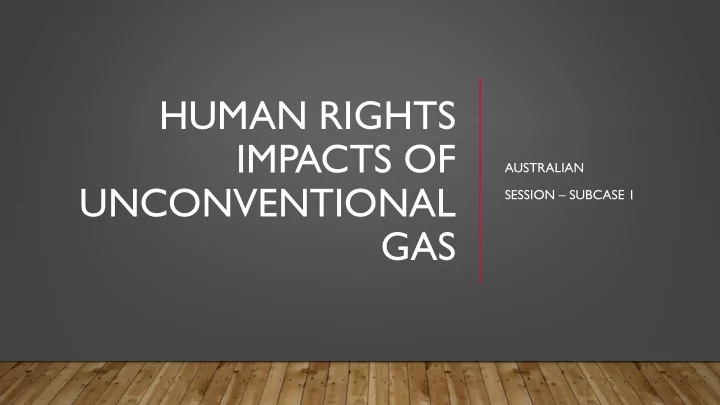

HUMAN RIGHTS IMPACTS OF AUSTRALIAN UNCONVENTIONAL SESSION – SUBCASE 1 GAS
SUBCASES Right to Health Health impacts Right to food, water, housing impacts Infrastructure Right to safe, healthy, sustainable environment impacts Climate change Right to participation fuels pursuit of fossil subsidised Government Right to cultural heritage, land, resources, social social impacts Cultural and
SUBCASE 1 – HEALTH AND INFRASTRUCTURE The human health subcase will examine • the health impacts of unconventional gas, both acute and chronic, especially for vulnerable groups – due to exposures to endocrine disruptors, known and probable carcinogens, radon gas, neuro- and developmental toxicants, ozone, and noise.
TESTIMONY INVITED • The following is a summary of the issues associated with this subcase. • You are invited to provide testimony or witness statements supporting this subcase.
Unconventional Gas Mining Inquiry 2015: Dr Geralyn McCarron Submission 12 NO DATA • No baseline studies and no health impact assessments were done prior to the Coal Seam Gas production licences being issued in Queensland, and in NO PROBLEM Queensland comprehensive health studies have still not been done. Real time air quality monitoring has never been done. Science has been singularly lacking. There has been no comprehensive assessment of the level of fugitive emissions from the Queensland gas fields. In Queensland there are effectively no limits on emissions from each well or the wider reticulation system. The gas companies can flare or vent 3 million cubic meters of gas from each well during production testing before having to even pay royalties. Emissions from the thousands of high point vents are not used in any calculation of emissions. • People living in the Queensland gasfields are subjected to the emissions of raw gas (including BETX) being vented from thousands upon thousands of gas relief vents on the water gathering lines. These emissions are not being monitored by government, and no publically available data on the releases from these vents is available from industry. Yet, some of these vents are within of few metres from family homes. Families including vulnerable children are also subjected to particulate pollution and monocyclic and polycyclic aromatic hydrocarbons when raw, unprocessed gas is used as fuel to power the gas wells themselves. They are subjected to the noxious emissions from the flares, from the compressor stations, processing plants and water treatment plant, so that this raw gas can be “cleaned” to trade specifications and pumped overseas.
NO DATA NO PROBLEM • The industry and government have failed to establish baselines prior to the rapid development of the industry • Communities have continuously raised concerns regarding impact on health both direct and indirect • To date no formal health study has been undertaken to determine impacts of the industry. • Despite the lack of specific data regarding this industry, the impact of the fossil fuel industry is known
KNOWN HEALTH IMPACTS • The health costs associated with fossil fuel energy production and consumption are significant • Current global and national energy policy privilege fossil fuels at the expense of safer, renewable, and more sustainable energy options. • In Australia, the health implications of energy policy are not currently considered in policy decisions regarding the allocation of energy sector subsidies, in plans for Australia’s energy future, in decisions regarding new energy infrastructure projects, nor in energy trade. Health and Energy Roundtable Briefing Paper February 2013 Health and Energy Policy Prepared by Fiona Armstrong, Elizabeth Haworth, Peter Tait, and Harriet Barker
HEALTH IMPACT • Human individual and societal health is determined by ecological as well as social factors. The provision of clean air, fresh water, and fertile soil are all ecosystem services that underpin society’s ability to feed, house, and clothe itself, provide protection from weather, help prevent the spread of disease and support psychological and emotional well-being. Health and Energy Roundtable Briefing Paper February 2013 Health and Energy Policy Prepared by Fiona Armstrong, Elizabeth Haworth, Peter Tait, and Harriet Barker
• These ‘externalities’ - health, social and environmental costs not accounted for in the market price of electricity or fuel costs - are nonetheless borne by the community
OVERVIEW OF HEALTH IMPACT EXPOSURES No gas wells EA development emissions
SPECIFIC HEALTH EXPOSURES
ZOOM IN TO CHINCHILLA TARA DALBY TRIANGLE
NATIONAL POLLUTANT INVENTORY DATA
TESTIMONY INVITED • This has been a brief summary of the basics of the impacts that this industry has on health. • Please contact us to provide your testimony regarding the impact of the industry on health.
E • HRTribunal@gmail.com CONTACT US CONVENOR FB • @HRTribunal
Recommend
More recommend